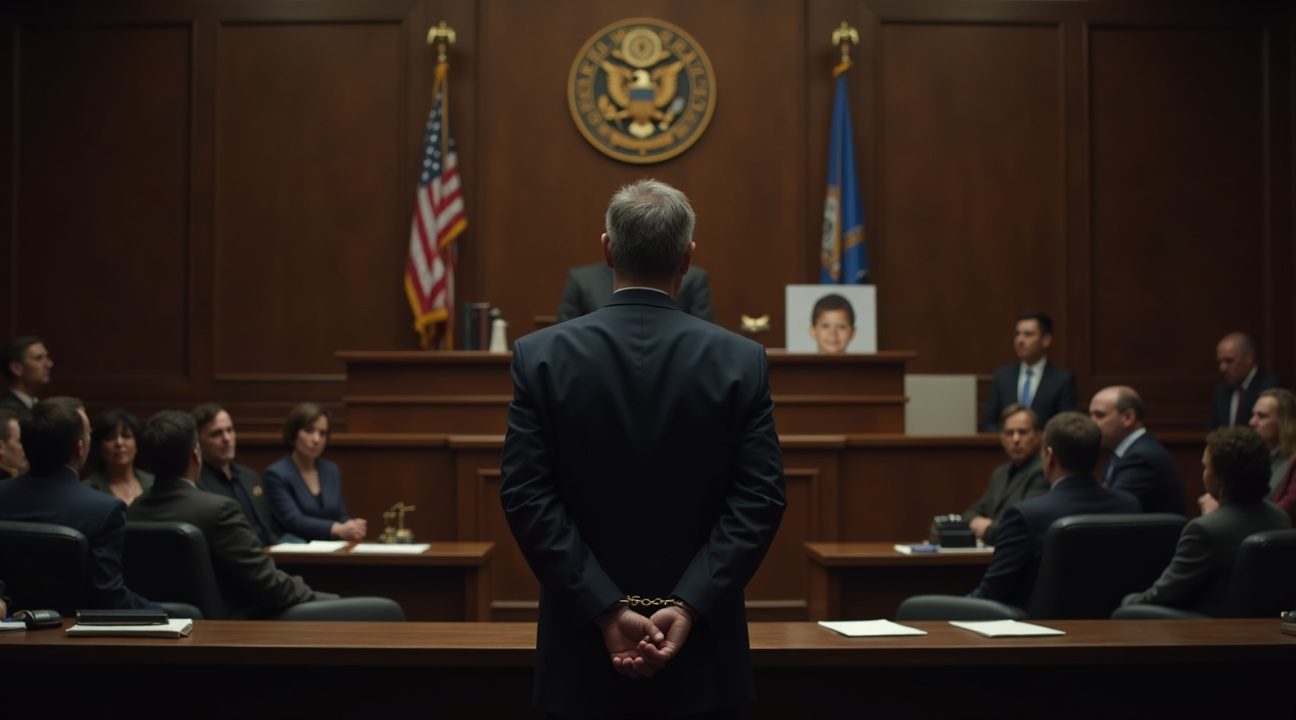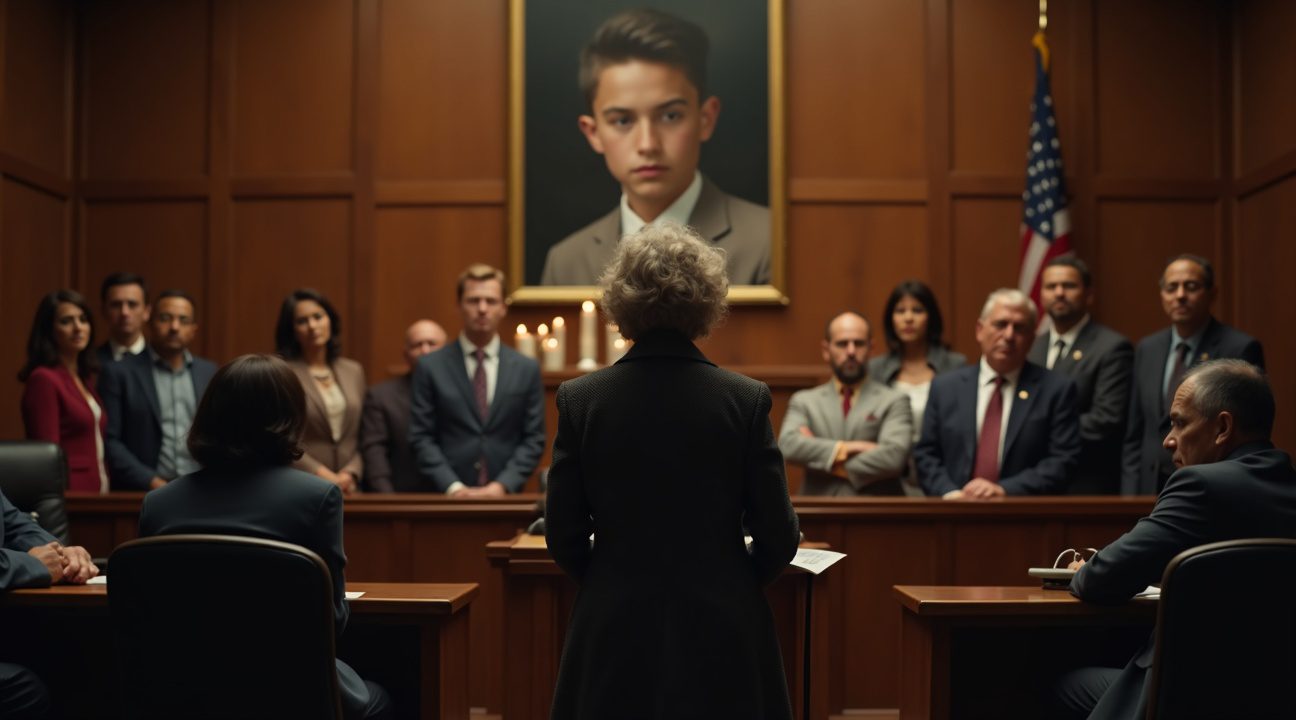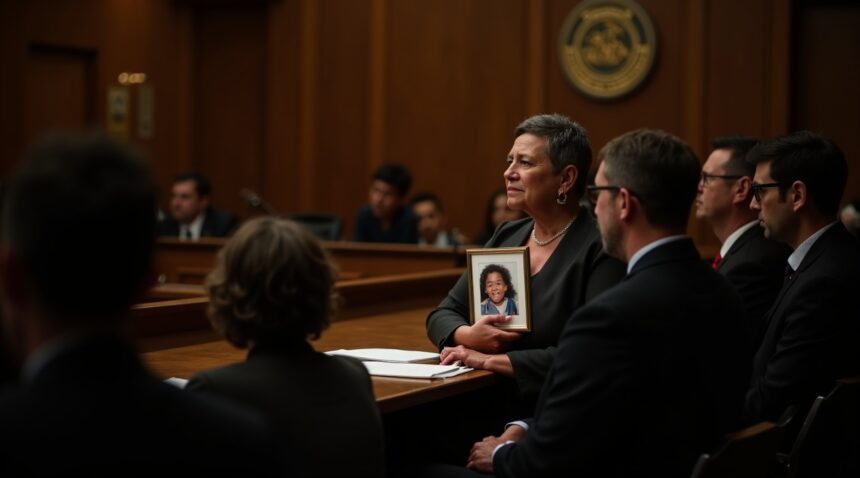Jake Haro, a 32-year-old father from Riverside County, was sentenced to 25 years to life for the brutal murder of his seven-month-old son Emmanuel, following a series of assaults and a manufactured kidnapping hoax.
Key Takeaways
- Jake Haro received a sentence of 25 years to life for murdering his infant son Emmanuel. This punishment includes an additional six-plus years tied to prior offenses, all to be served consecutively.
- Haro was previously convicted of child abuse in 2018 for severely injuring a young infant girl. At the time, he was granted probation instead of prison time.
- The case initially unfolded as a missing child report, spurring large-scale community efforts to locate the child. It was later uncovered that the kidnapping claim was fabricated by the parents to conceal the crime.
- Financial penalties imposed on Haro include $10,000 in restitution to victims and over $20,000 in fines and court-related fees. He is entirely ineligible for probation.
- Community reactions have been intense, with family members and local advocates condemning systemic lapses in law enforcement and child protective services. This tragic event is prompting renewed discussions on justice system reforms.
Context of the Sentencing
In November 2025, the Riverside County Superior Court concluded the harrowing case against Jake Haro. Due to his 2018 child abuse conviction, the judge denied any possibility of probation and emphasized the repeat nature of Haro’s actions. More details on the sentencing proceedings can be found on the official site of the Riverside County District Attorney’s Office.
Implications and Public Response
The conclusion of this case has led to widespread public calls for systemic change, particularly in the way child abuse cases are managed and monitored. Lawmakers and activists are now pushing for enhanced background checks, intervention programs, and stricter sentencing for repeat offenders to prevent future tragedies of this nature.
Father of 7-Month-Old Emmanuel Haro Gets 25 Years to Life for Murder
A Riverside County judge delivered a harsh sentence to Jake Haro on November 3, 2025, condemning the 32-year-old father to 25 years to life in prison for the murder of his infant son, Emmanuel Haro. The seven-month-old baby’s death shocked the community and highlighted the devastating consequences of child abuse.
Haro’s case reached its conclusion after he entered a guilty plea in October 2025, admitting to the horrific crime that took his son’s life. Court documents revealed the disturbing details of how Haro killed Emmanuel through repeated assaults, painting a picture of sustained violence against a defenseless infant. The case drew parallels to other high-profile sentencing cases, including instances where individuals received life sentences for serious violent crimes.
Comprehensive Sentencing Details
The judge’s decision extended beyond the primary murder charge, addressing Haro’s criminal history comprehensively. Additional prison time totaling more than six years was imposed for Haro’s prior offenses, with these sentences running consecutively alongside the life term. This approach ensures Haro will face the full weight of his criminal actions without the possibility of concurrent sentencing reducing his time behind bars.
Financial penalties accompany the prison sentence, reflecting the court’s effort to address the broader impact of Haro’s crimes:
- $10,000 in restitution payments
- More than $20,000 in combined fines and court fees
- Complete ineligibility for probation consideration
Haro’s previous child abuse history played a crucial role in the sentencing decision. The judge determined that his prior record of harming children made him ineligible for any form of probation, ensuring he cannot seek early release or alternative sentencing options. This history likely influenced the severity of the sentence, as courts typically impose harsher penalties on repeat offenders, particularly in cases involving serious criminal behavior.
The case represents a tragic example of infanticide, where a parent becomes the perpetrator of violence against their own child. Such cases often involve complex psychological and social factors, though these circumstances don’t diminish the severity of the crime or the need for justice. The repeated nature of the assaults, as documented in court records, suggests a pattern of escalating violence that ultimately led to Emmanuel’s death.
Similar high-profile cases have demonstrated how the justice system handles violent crimes against children, with courts often imposing maximum sentences to reflect society’s protection of vulnerable victims. The entertainment industry has also seen its share of legal troubles, with cases like actors facing potential jail time for various offenses, though none as severe as Haro’s case.
The financial obligations imposed on Haro serve multiple purposes beyond punishment. Restitution payments acknowledge the economic impact of the crime, while fines and court fees help offset the administrative costs of prosecution and ensure the defendant bears responsibility for the legal proceedings they necessitated.
Emmanuel Haro’s death at just seven months old represents an irreplaceable loss, cutting short a life that had barely begun. The severity of the sentence reflects not only the heinous nature of the crime but also society’s commitment to protecting children from those who would harm them. The consecutive nature of Haro’s sentences ensures he’ll remain incarcerated for decades, preventing him from potentially harming other children.
The case joins a disturbing catalog of crimes where individuals face significant prison sentences for violent actions. While some cases involve different circumstances, the underlying message remains consistent: the justice system will pursue maximum penalties for those who harm innocent victims, particularly children who cannot defend themselves.
Missing Baby Case Turns Deadly: From False Claims to Murder Charges
The disappearance of Emmanuel Haro on August 14, 2025, initially sparked what appeared to be a standard missing child investigation in California. Law enforcement agencies mobilized quickly, launching extensive search operations while the community rallied behind what they believed was a desperate family seeking their lost child.
From Missing Child to Murder Investigation
Eight days after Emmanuel’s reported disappearance, the case took a dramatic turn when authorities arrested Jake and Rebecca Haro on August 22, 2025. Investigators determined the parents had fabricated an elaborate kidnapping story to conceal their son’s actual fate. The charges against both parents shifted from filing false reports to murder, fundamentally altering the nature of the investigation.
Jake Haro’s participation in the search efforts alongside law enforcement in Moreno Valley now appears particularly disturbing in hindsight. He actively assisted officers and volunteers while allegedly knowing his son was already dead. This level of deception during such a critical investigation demonstrates the calculated nature of the cover-up attempt.
Search Efforts and Evidence Challenges
Despite the intensive search operations that followed Emmanuel’s reported disappearance, his body was never recovered. Officials indicated they had developed strong leads about potential burial locations, but these searches ultimately proved unsuccessful. The lack of physical remains presented significant challenges for prosecutors building their case against the parents.
The investigation revealed disturbing evidence suggesting Emmanuel had endured severe abuse over an extended period before his death. Prosecutors argued this pattern of abuse culminated in the child’s murder, which the parents then attempted to disguise as a kidnapping. This systematic abuse allegation became central to the prosecution’s case against both defendants.
The case highlights the complex dynamics that can emerge in family violence situations, particularly those involving serious criminal charges against parents. The fabricated kidnapping story initially drew community sympathy and extensive law enforcement resources, making the eventual revelation of the parents’ alleged involvement even more shocking to those who had participated in search efforts.
Law enforcement’s ability to uncover the truth despite the elaborate deception demonstrates the thoroughness of modern investigative techniques. Even without recovering Emmanuel’s remains, prosecutors felt confident enough in their evidence to pursue murder charges against both parents. The case serves as a reminder that missing child investigations require careful scrutiny of all possibilities, including the tragic reality that family members may sometimes be responsible for a child’s disappearance.
The community impact of such cases extends far beyond the immediate family, affecting volunteers, law enforcement personnel, and neighbors who invested time and emotional energy in search efforts. These individuals must process not only the loss of a child but also the betrayal involved when those they sought to help are allegedly responsible for the tragedy they were working to resolve.
Repeat Child Abuser: Haro’s 2018 Conviction and Probation Failure
Jake Haro’s 2024 sentencing wasn’t his first encounter with the justice system for child abuse. It is deeply troubling that this convicted abuser had already destroyed one child’s life before taking Emmanuel’s. In 2018, Haro was convicted for severely abusing an infant girl, leaving her permanently bedridden and unable to perform basic functions like walking or feeding herself.
The 2018 case reveals a shocking pattern of violence against the most vulnerable members of society. This previous victim, like Emmanuel, suffered life-altering injuries at Haro’s hands. The severity of her condition—requiring permanent care and unable to achieve basic developmental milestones—demonstrates the devastating impact of Haro’s actions on innocent children.
A Lenient Sentence That Proved Fatal
Rather than receiving prison time for his 2018 conviction, Haro was sentenced to probation. This decision would later prove catastrophic. The current district attorney publicly criticized the lenient sentence as a grave error in judgment, and prosecutors in the 2024 case made a compelling argument that Emmanuel might still be alive today if Haro had been incarcerated following his first conviction.
This probationary sentence allowed a known child abuser to remain in the community with access to vulnerable children. The justice system’s failure to recognize the severity of Haro’s actions in 2018 directly contributed to Emmanuel’s tragic death. Cases involving serious crimes against children require the harshest possible sentences to prevent future victims.
Systemic Failures in Monitoring Known Abusers
Beyond the lenient sentencing, the justice system failed to adequately monitor Haro during his probation period. This case exposes critical gaps in how convicted child abusers are supervised and tracked. The monitoring systems designed to protect children from repeat offenders clearly broke down, allowing Haro continued access to vulnerable infants.
Prosecutors emphasized how the 2018 conviction should have served as a red flag for any future investigations involving Haro and child welfare. The fact that he was able to abuse Emmanuel while supposedly under supervision raises serious questions about probation oversight and child protection protocols. Similar oversight failures have led to life sentences in other jurisdictions where repeat offenders weren’t properly monitored.
The Haro case has reignited crucial discussions about how child abuse cases are handled within the legal system. This is a watershed moment that exposes the dangerous consequences of treating child abuse as anything less than the serious violent crime it represents. Legal experts argue that the 2018 sentencing decision reflects broader systemic issues with how courts assess risk in child abuse cases.
This pattern of escalating violence isn’t uncommon among child abusers, yet the justice system often fails to recognize the predictive value of previous convictions. The connection between Haro’s 2018 conviction and Emmanuel’s death in 2024 demonstrates why rehabilitation-focused approaches may be inappropriate for certain categories of violent offenders. When facing massive jail time, repeat offenders like Haro should have been removed from society before claiming additional victims.
The case also highlights the need for improved communication between child protective services and the criminal justice system. Had proper protocols been in place, Haro’s history of child abuse should have triggered immediate intervention when Emmanuel first showed signs of injury. Instead, the system’s failure to connect these dots allowed a known predator to continue his pattern of violence against helpless children.
No Plea Deal: Direct Admission of Guilt and Consecutive Sentencing
Jake Haro’s case took an unusual turn in October 2025 when he entered guilty pleas directly to the court rather than negotiating with prosecutors. This direct admission of guilt covered three serious charges: second-degree murder, assault resulting in the death of a child, and filing a false police report. The absence of a plea bargain meant Haro received no reduction in charges or sentencing recommendations from the prosecution.
Consecutive Sentencing Structure
The court’s decision to impose consecutive sentences rather than concurrent ones significantly extended Haro’s time behind bars. Under this sentencing structure, Haro must serve each sentence one after the other, resulting in a minimum of 31 years before parole eligibility. This approach differs from concurrent sentencing, where multiple sentences run simultaneously and typically result in shorter overall prison terms.
Judicial Reasoning and Rejected Claims
The judge’s decision to deny leniency stemmed from several aggravating factors in Haro’s background. His prior history of child abuse played a central role in the court’s reasoning, demonstrating a pattern of behavior that influenced the harsh sentencing. Additionally, Haro’s probation status at the time of these offenses indicated he had already received judicial mercy in previous cases, making him ineligible for further consideration.
Haro’s public defender attempted to secure financial relief by arguing their client’s indigent status prevented him from paying court-imposed fines. The court rejected this claim, suggesting either sufficient assets existed or that the financial penalties would remain regardless of ability to pay. This decision reflects the serious nature of cases involving life sentences where courts prioritize justice over financial considerations.
The combination of direct guilty pleas without prosecutorial negotiation, consecutive sentencing, and the rejection of financial hardship claims created a comprehensive punishment reflecting the severity of Haro’s crimes. Criminal cases involving child victims often result in enhanced penalties, particularly when defendants have established patterns of abuse. Similar to other high-profile cases where individuals face significant prison time, the court’s approach emphasized accountability over rehabilitation.

Family Devastation and Community Outrage at Sentencing
Emotional Courtroom Testimony
Emmanuel’s maternal grandmother, Mary Beushausen, delivered a heart-wrenching victim impact statement that captured the profound devastation this case has brought to her family. She stood before the packed courtroom and demanded the maximum penalty, expressing her deep frustration with the justice system for having previously given Haro what she characterized as an unwarranted second chance. “He destroyed my whole family,” she told the court, her words echoing the pain that countless families experience when violent offenders receive sentences that many view as insufficient.
Beushausen’s statement highlighted the ripple effects of violent crimes against children, showing how these acts damage not just the immediate victim but entire family networks. Her powerful testimony underscored the lasting trauma that families endure long after the legal proceedings conclude. The grandmother’s words carried particular weight given her role as a primary caregiver and advocate for Emmanuel throughout this difficult process.
Community Response and Calls for Reform
The courtroom was filled to capacity during sentencing, reflecting the overwhelming public interest and community outrage surrounding this case. Local residents packed the gallery, demonstrating the widespread concern about child safety and the effectiveness of current sentencing guidelines. This massive turnout illustrated how deeply this tragedy has affected the broader community beyond Emmanuel’s immediate family.
The district attorney emphasized this case as a painful example of the justice system’s failure to protect vulnerable children from known abusers. This acknowledgment from law enforcement leadership has sparked renewed discussions about systemic changes needed to prevent similar tragedies. The prosecutor’s candid assessment reflects growing recognition that current protocols may be inadequate for protecting society’s most vulnerable members.
Community leaders and advocacy groups continue to call for comprehensive child welfare reforms and stronger sentencing guidelines for repeat offenders. These demands focus on several key areas that many believe need immediate attention:
- Enhanced background check systems for individuals working with children
- Stricter monitoring protocols for known offenders with histories of child abuse
- Mandatory minimum sentences for repeat child abuse convictions
- Improved communication between different agencies handling child welfare cases
- Expanded resources for victim support services and family counseling programs
The case has become a rallying point for those who believe the current system fails to adequately deter repeat offenses against children. Many community members argue that serious crimes against vulnerable populations require more aggressive prosecution and longer sentences to protect future victims.
Local advocacy organizations have used this tragedy to push for legislative changes at both state and federal levels. They argue that Emmanuel’s death could have been prevented with stricter oversight of individuals with previous convictions for child abuse. These groups point to this case as evidence that the justice system’s approach to repeat offenders needs fundamental restructuring.
The overwhelming community response has also led to increased scrutiny of how child protective services handled previous reports about Haro. Many residents question whether adequate safeguards were in place and whether warning signs were properly investigated. This examination has prompted calls for better training, increased funding, and improved coordination between various agencies responsible for child welfare.
Community members have organized vigils and advocacy events in Emmanuel’s memory, channeling their grief into demands for meaningful reform. These gatherings serve both as memorials for the young victim and as platforms for discussing concrete steps to prevent similar tragedies. The sustained public attention suggests this case will continue influencing policy discussions for years to come.
The case has drawn comparisons to other high-profile incidents where individuals facing serious charges received what many considered lenient treatment from the justice system. These comparisons have intensified calls for consistency in sentencing and a more victim-focused approach to criminal justice proceedings involving crimes against children.

Sources:
ABC News, “Jake Haro, father of missing baby Emmanuel Haro, sentenced to 25 years to life in prison for murder”
KESQ, “Jake Haro sentenced to 25 years to life for murder of infant son”
FOX 11 Los Angeles (YouTube), “Dad of Emmanuel Haro sentenced to 25 years to life for murder”
ABC30 (KABC), “Baby Emmanuel’s father Jake Haro sentenced 25 years to life for 7-month-old son’s murder”
Riverside County District Attorney’s Office, “Jake Haro Sentenced to 25 to Life for the Murder of His Son”
The Desert Sun, “Jake Haro gets 25 years to life for killing infant son, Emmanuel Haro”
CBS News Los Angeles, “Father of 7-month-old Emmanuel Haro sentenced for son’s murder”


